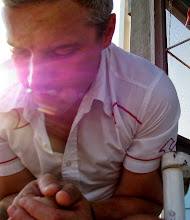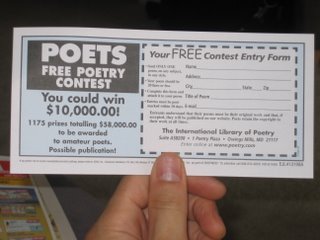
About Me

- christopher salerno
- Assistant Professor, William Paterson University of New Jersey, United States
Tuesday, June 27, 2006
Sunday, June 18, 2006
HATE is totally the new LOVE
Paul
~W.S. Merwin
Up the sea-dark avenue
at two in the morning a shadow
comes shouting oh
you mother-fucker I hate you Paul
echoes of feet and then
I hate you I hate you Paul
the old moon is sinking through
clouds beyond high wires and cornices
the buildings creak
drifting on the tunnelled hour the call
bounces ahead along
the street like a fleeing ball
there after each of the few
cars has passed over its words Paul you
can't get away
I hate you with my feet in the Paul
street like a bell I know
you are there you nowhere Paul
I am coming after you
whatever you do whatever you
think I hate you
across the street into the doors all
the way through the frozen
windows up against the wall
listen to me I hate who
you are nobody else will ever
hate you the way
I do I always hated you Paul
the whole time thinking you
could hold out on me that small
invisible you but to
me listen there was nothing to you
I was onto
you fooling with me your slick tricks all
the while and I hate you
where you are everywhere Paul
I go on hating you through
the roar of the Paul subway the red
lights at the Paul
cross streets out of sight into the Paul
night that cannot be touched
nor brought back by hate at all.
________________________________________________________________
Timing. A friend sent me this Merwin poem she found. And just this morning I was thinking about Hate. I know, it sounds strange...but I was thinking of a lesson, or of creating an exercise for my Intro Poetry class surrounding the idea of Love and Hate and the mining out of the emotional complexities in between. It occured to me, probably via some poem or someone smart giving a talk, about the opposite of Love, and what Love's opposite might be. Most people would say that the opposite of Love is Hate. However, it seems that the opposite of love is actually Indifference. Hate, really, is only for effect. When we say that we Hate, we are exposing a kind of connection to the object of that hatred, right? We are, in some sense, putting that connection on display, much like in this poem. Our hate has a history, usually a personal history...and it often can show us our own Shadow, especially in the Jungian sense. “At two in the morning a shadow / comes screaming oh / you mother-fucker I hate you Paul…” And we also read the lines, "The old moon is sinking through / clouds behind high wires..." There's a specific, almost literal sense of history in the situation of the speaker and his/her relationship to Paul, a past exposed there (in the Paul subway...into the Paul cross streets...into the Paul night...") but so too in the simple act of characterizing the moon as "old." Even that simple image conjures the personal history. And of course there is the ultimate example of the Love/Hate connection, "nobody else will ever hate you / the way I do."
I like it.
I also love the way the word Hate is deployed as an unconventional verb (I hate you / across the street / into the doors..." And I like the way Paul becomes an adjective, mostly through the blurred syntax and absent punctuation and fused phrases—together with all of this a strong voice tumbles out down the page...and a great sense of the organic nature of rage speak emerges.
Indifference, then, implies no connection at all, I guess. It's so much colder than Hate. Hate is always connected to Love. This poem could never be written out of Indifference. Probably no Lyric poems could be.
~W.S. Merwin
Up the sea-dark avenue
at two in the morning a shadow
comes shouting oh
you mother-fucker I hate you Paul
echoes of feet and then
I hate you I hate you Paul
the old moon is sinking through
clouds beyond high wires and cornices
the buildings creak
drifting on the tunnelled hour the call
bounces ahead along
the street like a fleeing ball
there after each of the few
cars has passed over its words Paul you
can't get away
I hate you with my feet in the Paul
street like a bell I know
you are there you nowhere Paul
I am coming after you
whatever you do whatever you
think I hate you
across the street into the doors all
the way through the frozen
windows up against the wall
listen to me I hate who
you are nobody else will ever
hate you the way
I do I always hated you Paul
the whole time thinking you
could hold out on me that small
invisible you but to
me listen there was nothing to you
I was onto
you fooling with me your slick tricks all
the while and I hate you
where you are everywhere Paul
I go on hating you through
the roar of the Paul subway the red
lights at the Paul
cross streets out of sight into the Paul
night that cannot be touched
nor brought back by hate at all.
________________________________________________________________
Timing. A friend sent me this Merwin poem she found. And just this morning I was thinking about Hate. I know, it sounds strange...but I was thinking of a lesson, or of creating an exercise for my Intro Poetry class surrounding the idea of Love and Hate and the mining out of the emotional complexities in between. It occured to me, probably via some poem or someone smart giving a talk, about the opposite of Love, and what Love's opposite might be. Most people would say that the opposite of Love is Hate. However, it seems that the opposite of love is actually Indifference. Hate, really, is only for effect. When we say that we Hate, we are exposing a kind of connection to the object of that hatred, right? We are, in some sense, putting that connection on display, much like in this poem. Our hate has a history, usually a personal history...and it often can show us our own Shadow, especially in the Jungian sense. “At two in the morning a shadow / comes screaming oh / you mother-fucker I hate you Paul…” And we also read the lines, "The old moon is sinking through / clouds behind high wires..." There's a specific, almost literal sense of history in the situation of the speaker and his/her relationship to Paul, a past exposed there (in the Paul subway...into the Paul cross streets...into the Paul night...") but so too in the simple act of characterizing the moon as "old." Even that simple image conjures the personal history. And of course there is the ultimate example of the Love/Hate connection, "nobody else will ever hate you / the way I do."
I like it.
I also love the way the word Hate is deployed as an unconventional verb (I hate you / across the street / into the doors..." And I like the way Paul becomes an adjective, mostly through the blurred syntax and absent punctuation and fused phrases—together with all of this a strong voice tumbles out down the page...and a great sense of the organic nature of rage speak emerges.
Indifference, then, implies no connection at all, I guess. It's so much colder than Hate. Hate is always connected to Love. This poem could never be written out of Indifference. Probably no Lyric poems could be.
Wednesday, June 14, 2006
Tuesday, June 13, 2006
PERSONAL

It's my birthday today. I keep forgetting. And not too many folks want a piece of me, so that's good. I looked at some postcards of the Whirligig cover, read a few 70's comic books I found recently, and bought myself a few CD's: the newest Wolfparade, Sufjan Stevens' "Michigan," Bonnie Prince Billy's "Master and Everyone" (wore out a burned copy), and Tom Waits' "Real Gone.
Anyway, I want to say that while I was serious about being a C-section baby, I was not serious about the Anthology. Sorry for any confusion.
Friday, June 09, 2006
Sunday, June 04, 2006
English 289
So I’ve been tweaking my syllabus for the upcoming Poetry Workshop I teach at NC STATE University. Since I haven’t yet found a comprehensive enough text (outside of the Introductory handbook we use--which contains several poems) I supplement quite extensively by creating a kind of 20-poet mini-anthology of photocopied poems. These poems I often use as examples of one sort of turn, tool, convention, mode, etc. The poets included are: Charles Bernstein, T.S. Eliot, Adam Zagajewski, Dean Young, Gertrude Stein, W. C. Williams, Charles Bukowski, Yusef Kamanyakaa, Franz Wright, John Berryman, Billy Collins, Theodore Roethke, Lisa Jarnot, Sharon Olds, Wallace Stevens, Robert Bly, Rosemarie Waldrop, Allen Ginsberg, Charles Wright, Jeffrey McDaniel, and A. R. Ammons.
Subscribe to:
Comments (Atom)





